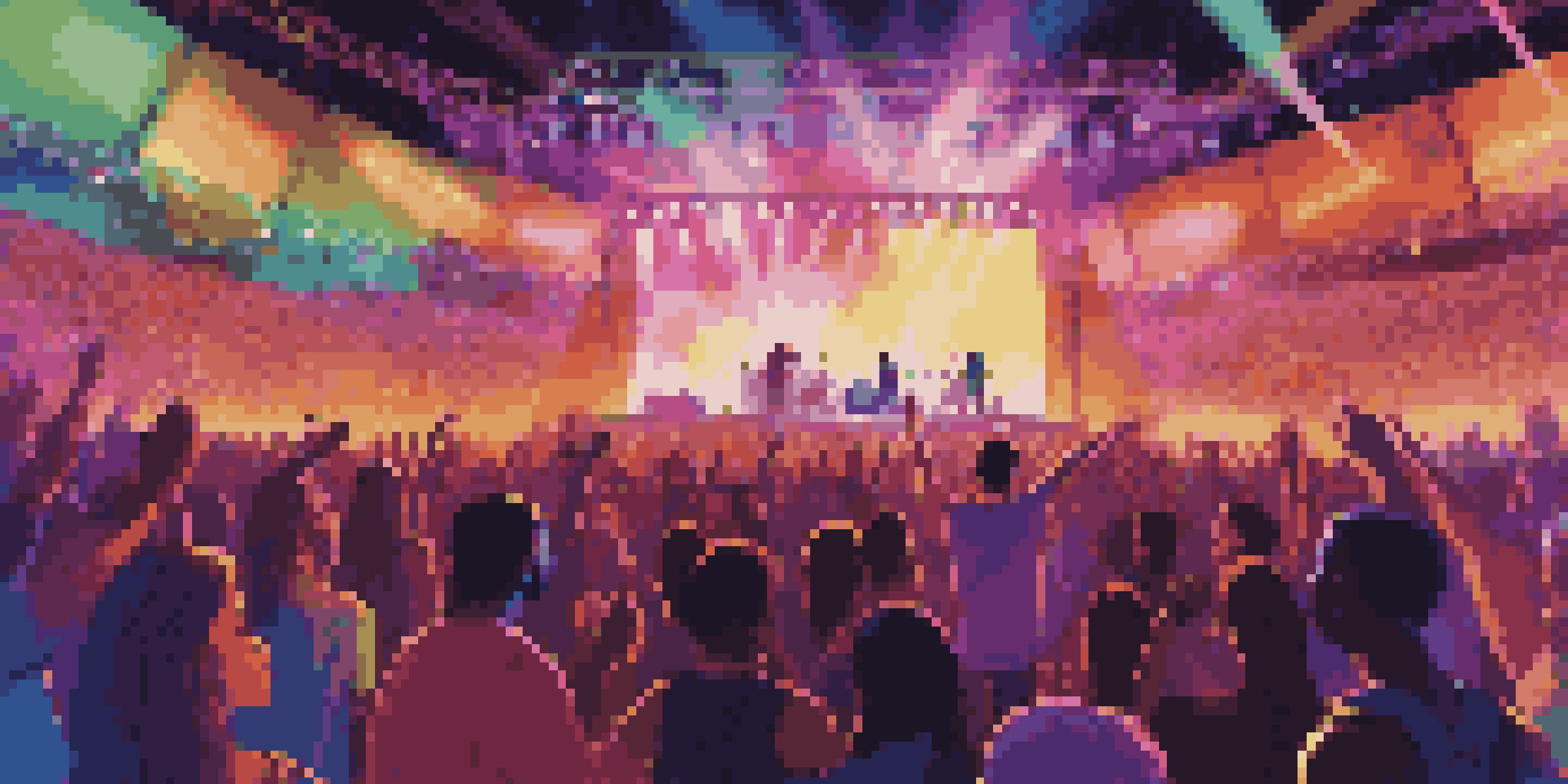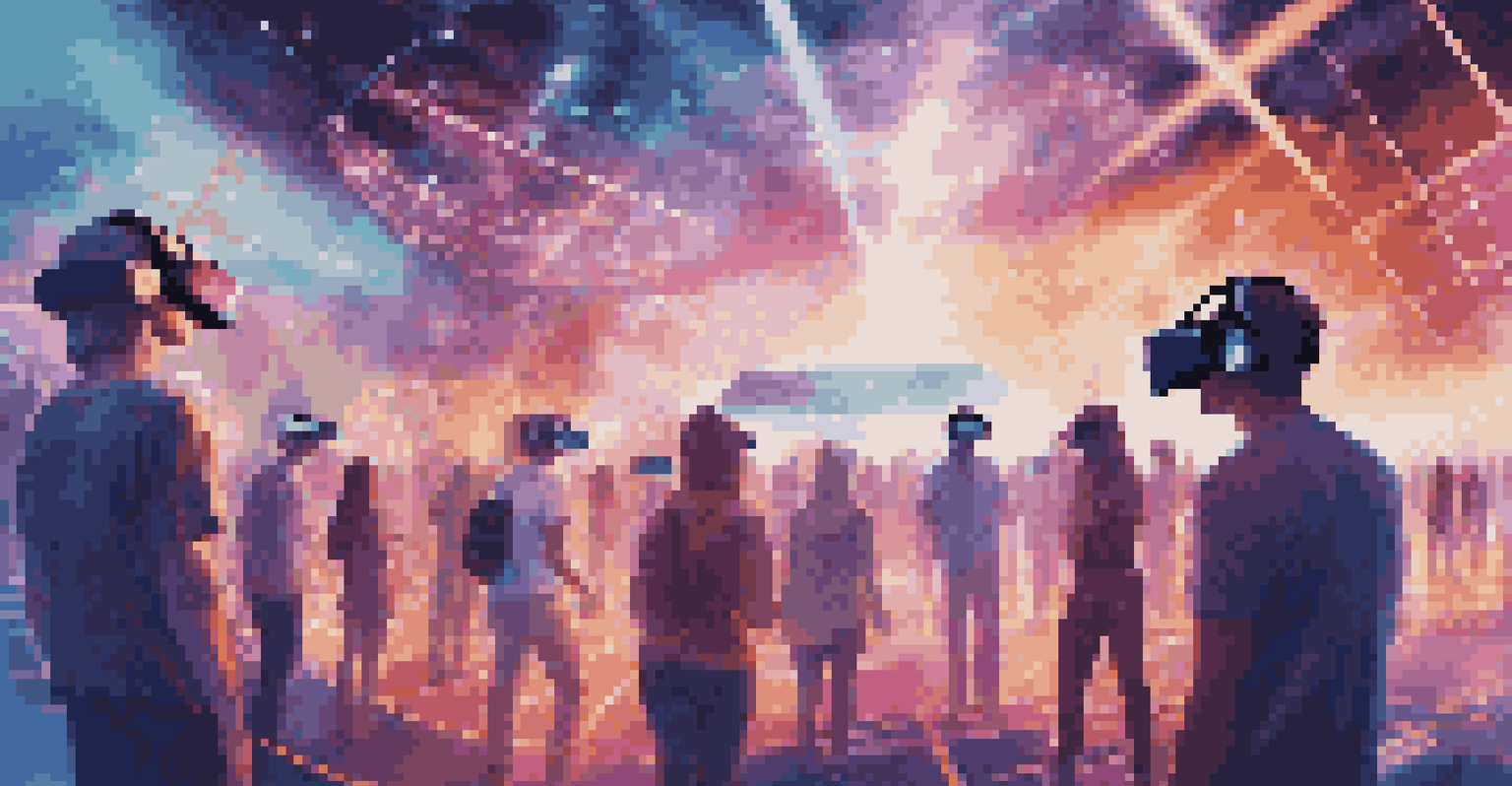The Influence of Digital Music Festivals on the Industry

The Rise of Digital Music Festivals in Recent Years
Digital music festivals have surged in popularity over the past few years, especially amid the global pandemic. Many traditional festivals adapted to the digital realm, allowing fans to enjoy performances from the comfort of their homes. This shift not only made music more accessible but also reached a wider audience than ever before, breaking geographical barriers.
The future of music festivals is not in one place, but in many places, thanks to digital platforms that connect us all.
As platforms like YouTube and Twitch hosted virtual events, artists found new ways to engage with fans. Live streams, interactive chats, and exclusive behind-the-scenes content created a unique festival experience. These digital spaces transformed how musicians connect with their listeners, paving the way for innovative formats and collaborations.
The success of these online events has prompted many festival organizers to consider a hybrid approach for the future, blending live and virtual experiences. This evolution signals a significant shift in the industry, as both artists and fans embrace the possibilities that digital platforms offer.
How Digital Festivals Change Artist Exposure and Discovery
Digital music festivals have become a game-changer when it comes to artist exposure. With major platforms hosting events, up-and-coming musicians can showcase their talents to a global audience. This newfound visibility enables them to gain traction and build a fanbase more quickly than through traditional means.

Moreover, many festivals now include curated stages that highlight emerging talent alongside established acts. This approach not only diversifies the lineup but also offers attendees a chance to discover new music they may not have encountered otherwise. It's like a treasure hunt for listeners, making the festival experience even more exciting.
Digital Festivals Boost Artist Exposure
Digital music festivals provide emerging artists with unprecedented visibility, allowing them to reach global audiences and build fanbases quickly.
As a result, digital music festivals have democratized the music industry, allowing for a broader range of voices and genres to be heard. This shift fosters a more inclusive environment, where diverse artists can thrive and connect with audiences eager for fresh sounds.
Impact on Revenue Streams for Artists and Organizers
The transition to digital festivals has also transformed revenue models for both artists and organizers. While traditional festivals relied heavily on ticket sales and merchandise, digital events have opened up new avenues for income, such as virtual VIP experiences and exclusive content subscriptions. This diversification helps artists sustain their careers in uncertain times.
Music is a world within itself; it’s a language we all understand, and digital festivals are breaking down barriers to access.
Additionally, sponsorship opportunities have evolved, with brands eager to engage audiences through innovative online experiences. This shift allows organizers to collaborate with sponsors in ways that enhance the festival experience, creating value for both parties. It’s a win-win situation that boosts the overall financial health of the music ecosystem.
However, it’s worth noting that the digital format presents its own challenges, such as ensuring fair compensation for artists. As the industry adapts, finding the right balance between accessibility and revenue generation will be crucial for the sustainability of digital music festivals.
Creating Unique Fan Experiences in a Digital Setting
One of the most exciting aspects of digital music festivals is the ability to create unique fan experiences. Gone are the days when fans needed to physically attend an event to enjoy their favorite artists. Now, digital platforms can offer immersive experiences through virtual reality or augmented reality, making fans feel like they are part of the action.
Interactive elements, such as live chats with artists and Q&A sessions, allow fans to engage in ways that are often not possible at traditional festivals. This sense of connection enhances the overall experience and fosters a deeper relationship between artists and their audiences. It’s as if the barriers of distance and time have dissolved, creating a more intimate atmosphere.
New Revenue Models in Digital Events
The shift to digital has diversified revenue streams for artists and organizers, moving beyond traditional ticket sales to include virtual experiences and content subscriptions.
As technology continues to evolve, the potential for even more engaging experiences is limitless. Future digital festivals may incorporate gamification, allowing fans to earn rewards or experiences through participation, further enhancing their connection to the music and the artists they love.
Sustainability and Eco-Friendliness of Digital Festivals
Digital music festivals also present an opportunity for the industry to embrace sustainability. Traditional festivals often contribute to significant carbon footprints due to travel, waste, and energy consumption. By shifting to a digital format, these events reduce their environmental impact and promote eco-friendliness.
Moreover, many organizers are using the momentum gained from digital festivals to raise awareness about sustainability issues in the music industry. By promoting eco-conscious practices and encouraging fans to participate in green initiatives, they can create a positive ripple effect that extends beyond the festival itself.
This focus on sustainability not only appeals to environmentally conscious fans but also positions artists and organizers as leaders in the movement towards a greener future. It’s an encouraging sign that the industry is evolving, making strides to balance entertainment with responsibility.
Challenges Faced by Artists and Organizers in the Digital Realm
Despite the many advantages of digital music festivals, there are also significant challenges that artists and organizers face. One major hurdle is the saturation of content available online; with countless events occurring simultaneously, capturing audience attention can be difficult. Artists must find creative ways to stand out in a crowded marketplace.
Additionally, the lack of in-person interaction can make it harder for artists to gauge audience reactions and connect on a personal level. This disconnect may affect the performance dynamics, as the energy of a live audience is hard to replicate virtually. Finding innovative ways to engage fans in real-time is essential for maintaining that connection.
Sustainability in Digital Music Festivals
Digital festivals reduce environmental impact and promote sustainability initiatives, positioning the music industry as a leader in eco-friendly practices.
Finally, technical issues can arise during live streams, leading to frustrations for both artists and viewers. Ensuring a smooth experience requires investment in technology and support, which can be a barrier for some smaller artists and organizers. Addressing these challenges will be crucial for the continued success of digital music festivals.
The Future of Digital Music Festivals: Trends to Watch
As we look to the future, several trends are emerging that will shape the landscape of digital music festivals. One notable trend is the integration of artificial intelligence and machine learning to create personalized experiences for fans. This technology can analyze listener preferences and recommend artists or genres, making each festival feel tailored to individual tastes.
Another trend is the potential for collaboration between festivals spanning different genres and cultures. These cross-genre festivals can introduce fans to diverse music styles and encourage boundary-pushing collaborations among artists. It’s a melting pot of creativity that could redefine the festival experience.

Lastly, as technology advances, we may see even more immersive experiences through virtual reality and augmented reality. These innovations could transport fans to entirely new worlds, enhancing their connection to the music and creating unforgettable memories. The future of digital music festivals is certainly bright and full of possibilities.